Supreme Leader Ayatollah Ali Khamenei blamed the war in Ukraine on the United States and Western powers. “The root of the crisis in Ukraine are the U.S. policies that create crisis, and Ukraine is one victim of these policies,” he said in a televised speech on March 1, 2022. The “mafia-like regime” in Washington “creates crises, lives off of crises and feeds on various crises in the world,” Khamenei claimed.
He cited Ukraine’s difficult situation as evidence that the United States is not a dependable ally. “Support by Western governments for administrations and politicians that have been installed by them is a mirage,” he insisted.
In July 2022, Russian President Vladimir Putin visited Tehran to boost bilateral relations. Khamenei more explicitly backed Moscow’s position in his remarks to Putin. In the case of Ukraine, “if you had not taken the helm, the other side would have done so and initiated a war.” Khamenei also called NATO a “dangerous entity.”
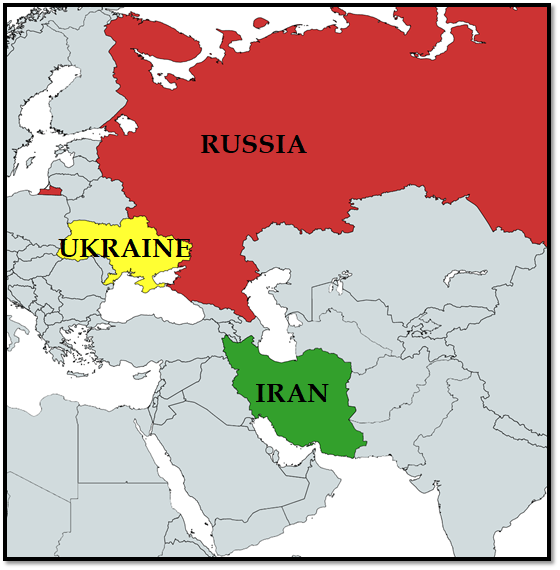 Iran’s policy evolved. Tehran initially criticized Washington for creating or inflaming tensions in Eastern Europe, but it was hesitant to take sides between Kyiv and Moscow. “We are very much concerned about escalation of tension between Ukraine and Russia,” Foreign Minister Hossein Amir-Abdollahian told the Munich Security Conference on February 19. “The Islamic Republic of Iran is having good relations with both sides and invites them to settle their differences through dialogue and peaceful means.”
Iran’s policy evolved. Tehran initially criticized Washington for creating or inflaming tensions in Eastern Europe, but it was hesitant to take sides between Kyiv and Moscow. “We are very much concerned about escalation of tension between Ukraine and Russia,” Foreign Minister Hossein Amir-Abdollahian told the Munich Security Conference on February 19. “The Islamic Republic of Iran is having good relations with both sides and invites them to settle their differences through dialogue and peaceful means.”
Iran’s tone shifted significantly after Russia invaded Ukraine on February 24, 2022. Leaders echoed the Kremlin’s talking points. “The expansion of NATO is a serious threat to the stability and security of independent countries in different regions,” President Ebrahim Raisi told President Vladimir Putin in a call on day one of the invasion.
“The Ukraine crisis has its roots in NATO’s provocative moves,” tweeted Foreign Minister Amir-Abdollahian. But he hedged his criticism. “We believe resorting to war is not the solution.”
Iran kept some distance from Russia, however, abstaining from a vote on a U.N. resolution condemning Russia’s invasion and calling for its withdrawal.
Opposition to the government position immediately emerged from Iranian dissidents and prominent political and media figures.
U.N. Votes
On March 2, 2022, in an emergency session of the U.N. General Assembly, 141 out of 193 member states voted for a resolution calling for the immediate withdrawal of Russian forces from Ukraine. Only five voted against it – Russia, Belarus, North Korea, Eritrea and Syria. Iran was among the 35 countries, including China, that abstained.
In a statement, Iran’s U.N. envoy, Ambassador Majid Takht Ravanchi, stressed that both the “sovereignty and territorial integrity of all states” and Russia’s security concerns must be respected. It also argued that the resolution lacked “impartiality and realistic mechanisms for resolving the crisis through peaceful means.”
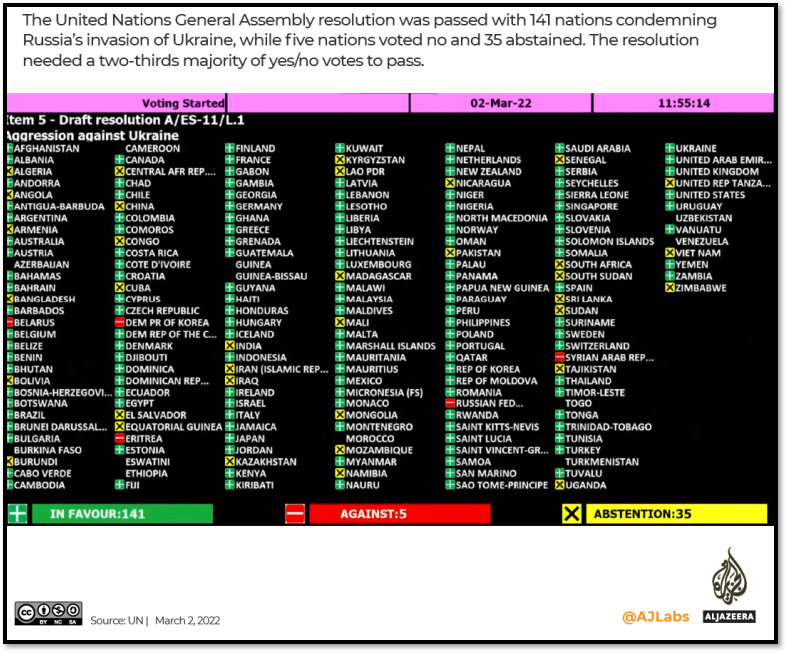
On April 7, 2022, 93 out of 175 U.N. member states voted to suspend Russia from the Human Rights Council “gross and systematic violations and abuses of human rights” and “violations of international humanitarian law” in Ukraine. The vote followed reports of an alleged massacre of civilians in the city of Bucha. Iran was among the 24 countries that voted against the resolution. Fifty-eight countries abstained.
Domestic Criticism
In the early days of Russia’s invasion, a wide range of Iranians, including those close to the regime and dissidents, diverged from the government’s line.
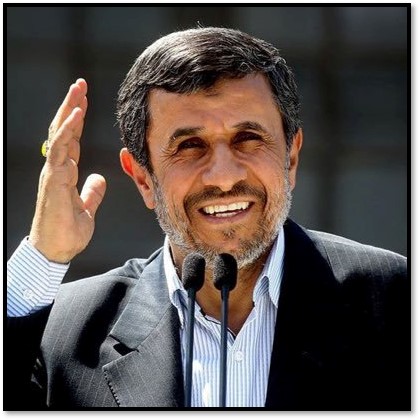
Former President Mahmoud Ahmadinejad praised Ukrainian President Zelensky. “Your honorable and almost unrivaled resistance uncovered the Satanic plots of enemies of mankind,” he tweeted on March 2. “Trust that the great nation of #Iran is standing by you, while admiring this heroic persistence.”
Ali Motahari, a conservative former member of Parliament, said that Iran must condemn Russia’s invasion to demonstrate its independence. State media is “reporting the news like a Russian colony,” he tweeted on February 24. “Let us always remember the separation of Georgia, Azerbaijan and Armenia from Iran by Russia and the Soviet support for Saddam in his attack on Iran.”
Faezeh Hashemi, a former member of Parliament and vice president of Iran's Olympic committee, criticized the regime for its “completely wrong stance” and “tumbling into the lap of the East.” The daughter of the late President Hashemi Rafsanjani, Hashemi said that Putin was greedy, but she also criticized Western powers for not doing more to prevent war. “We ought to have either remained neutral or condemned Russia’s having acted outside international standards,” she told a crowd.
Nasrin Sotoudeh, a world-renowned human rights lawyer and political prisoner, also condemned Russia. “Like millions of other people around the world, I too am shocked by this vulgar act of aggression,” she wrote in an open letter to U.N. Secretary General Antonio Guterres. “I stand in solidarity and support of the people of Ukraine and declare that world peace without opposition to Russia's aggression and support for the people of Ukraine is meaningless.”
Sadegh Zibakalam, a reformist analyst and professor of political science at Tehran University, tweeted an apology to the people of Ukraine for Iran’s support for Russia. “Contrary to the ruling regime,’’ he wrote, “many Iranians are with the Ukrainian people and condemn this aggression.” He added that Iranians, much like Russians, are not allowed to express their sympathy.
Mehdi Zakerian, a professor of international human rights law, criticized President Raisi for speaking as if he represented Russia instead of Iran. “Not only did you not condemn the use of force [by Russia], but you sympathized with Moscow's concerns in the region,” he said in an interview with Shargh, a reformist daily, on February 28.
Journalist Mohammad Mohajeri implicitly criticized the government’s position in a tweet directed at Interior Minister Ahmad Vahidi. “Would you agree to permit a protest rally if a group of Iranians decide to stage a rally in front of the Russian Embassy to protest the Russian invasion of Ukraine or is it against the national interest?” Mohajeri asked on February 25. “Is there a guarantee that Putin lovers will not attack?
Reza Ghobishavi, deputy editor of Asr-e Iran, a conservative news website, said that the invasion and Putin’s demands of Ukraine were “examples of arrogance and coercion” in a tweet on February 24. In another tweet, he said that some Iranian media outlets had “destroyed their credibility” by siding with Russia and “ignoring the facts.”
Hassan Beheshti Pour, a political analyst at the Institute for Iran-Eurasia Studies, warned against trusting Russia. “There is no guarantee they will not attack Iran as well,” he said in a televised interview on February 24.
Amid calls on social media for protests over the invasion of Ukraine, Iranian authorities reportedly blocked access to the area around the Russian embassy in Tehran. Videos posted on social media on February 26 showed a small group protestors gathered outside of the Ukrainian embassy chanting:
- “Death to Putin”
- “Russian Embassy Is Den of Spies”
- “Death to Warmongers and Putin Supporters”
- “Putin Murders, the Stupid Ones Support”
- “Long Live Ukraine," and "Long Live Peace”
More video from the anti-war protests tonight in front of the Russian Embassy in Tehran: “The Russian Embassy is a den of spies!” pic.twitter.com/7U0xriluyb
— Holly Dagres (@hdagres) February 26, 2022
Some 65 percent of Iranians said that Iran should remain neutral in the conflict, according to a nationwide public opinion poll conducted in February-March by the Iran Students Polling Agency.
Statements from Iranian officials on the Ukraine crisis are below, followed by background on Iran’s complicated relationship with Russia.
Supreme Leader Ayatollah Ali Khamenei
In a meeting with President Putin on July 19, 2022: “War is a violent and difficult endeavor, and the Islamic Republic is not at all happy that people are caught up in war. But in the case of Ukraine, if you had not taken the helm, the other side would have done so and initiated a war.”
In a televised speech on March 1, 2022: “In Ukraine, we are in favor of stopping the war.”
“Support by Western governments for administrations and politicians that have been installed by them is a mirage.”
“The U.S. regime creates crises, lives off of crises and feeds on various crises in the world. Ukraine is another victim of this policy.”
“In my view, Ukraine is a victim of the crises concocted by the United States.”
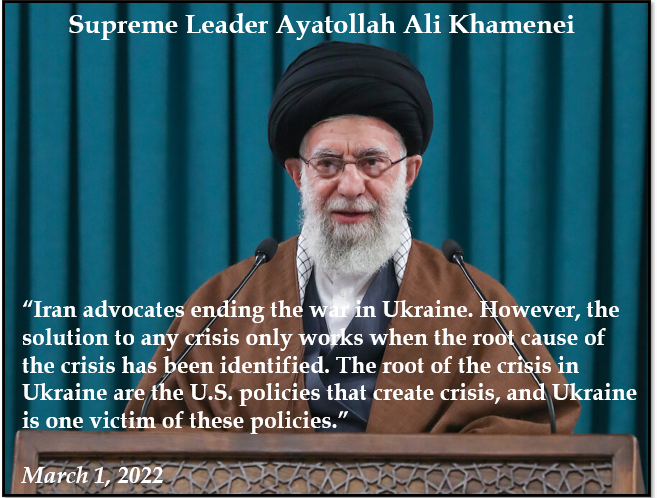 “There are two lessons to be learnt here. States which depend on the support of the U.S. and Western powers need to know they cannot trust such countries.”
“There are two lessons to be learnt here. States which depend on the support of the U.S. and Western powers need to know they cannot trust such countries.”
“Iran advocates ending the war in Ukraine. However, the solution to any crisis only works when the root cause of the crisis has been identified. The root of the crisis in Ukraine are the U.S. policies that create crisis, and Ukraine is one victim of these policies.”
“One of the most important slogans and stances taken by the Holy Prophet in Be’that was confronting ignorance.”
“The mafia networks of power that exist inside the United States feed on the crises that occur throughout the world.”
“All sorts of mafias – including political, economic and weapon manufacturing mafias – control that country. Behind the scenes, they bring individuals to power and eliminate others from the field. These mafias even bring presidents to power. This mafia regime has a need for various crises to be ongoing in different parts of the world. Therefore, they create them. Notice how many crises they have created in West Asia.”
In a speech on April 26, 2022: “Today, the world is on the threshold of a new international order which is being formed after [the failure of] the bipolar order and unipolar theory [as alleged by the Americans]. Of course, the U.S. is becoming weaker on a daily basis.”
“The recent Ukraine war should be looked at more deeply... This war isn't simply about a military invasion of a country. The roots of this invasion are deep and a complex, difficult future can be predicted.”
President Ebrahim Raisi
In a cabinet meeting on Feb. 27, 2022: “Based on its main foreign policy principles, the Islamic Republic of Iran is against domination and being dominated, and supports all nations' right to decide for their own future.”
"While understanding the security concerns regarding the decades of NATO expansionism, the Islamic Republic of Iran emphasizes the preservation of the territorial integrity and national sovereignty of all countries. We firmly believe that diplomacy and sincere adherence to international obligations by all parties is the only lasting and just way out of the current situation.”
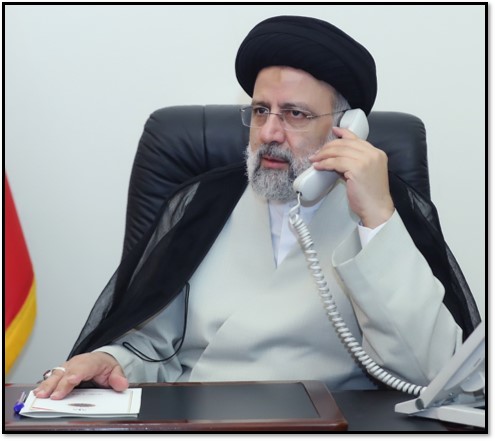 "The protection of the lives and property of citizens and civilians and the observance of international law and humanitarian law should be given serious attention by all parties".
"The protection of the lives and property of citizens and civilians and the observance of international law and humanitarian law should be given serious attention by all parties".
"It is necessary for the Ministry of Foreign Affairs and other responsible agencies to follow the previous regulations in order to protect all Iranian citizens, especially our students in Ukraine".
In a phone call with Russian President Vladimir Putin on Feb. 24, 2022: “The expansion of NATO is a serious threat to the stability and security of independent countries in different regions.”
Foreign Minister Hossein Amir-Abdollahian
In a tweet on Feb. 24, 2022: “The Ukraine crisis has its roots in NATO’s provocative moves. We believe resorting to war is not the solution. The establishment of a ceasefire and focusing on a political and democratic solution is a must.”
In a speech to the Munich Security Conference on Feb. 19, 2022: “We are very much concerned about escalation of tension between Ukraine and Russia. The Islamic Republic of Iran is having good relations with both sides and invites them to settle their differences through dialog and peaceful means.”
Secretary of the Supreme National Security Council Ali Shamkhani
In a tweet on Feb. 25, 2022: “Nothing is more hateful than war, but when the West seeks to strike at the national security of nations in various ways, it is in fact directly responsible for the wars and crises that are formed in order to resist the West's strategy. #UkraineCrisis”
In a tweet on Feb. 24, 2022: “Collapse of financial markets & sharp rise in energy prices due to the crisis in the easternmost part of Europe, showed that instability & insecurity in all its forms in eastern hemisphere will do serious damage to Western interests. The #UkraineCrisis can be an instructive lesson.”
Brigadier General Amir Nasirzadeh, Deputy Chief of Staff of the Armed Forces
In remarks on Feb. 28, 2022: The Ukrainians got rid of “deterrent nuclear power and were faced with this crisis.”
“In our country, some say we should [abandon] it and make peace. But in today's world it is impossible not to have military and deterrent power. Wherever we are weak, we will be hit.”
U.N. Ambassador Majid Takht Ravanchi
In a statement at an emergency U.N. General Assembly session on Ukraine on March 2, 2022:
Mr. President,
The Islamic Republic of Iran is following the ongoing conflict between Russia and Ukraine with grave concern.
We reiterate our principled position regarding the need for peaceful settlement of disputes in accordance with international law and underline the need for full respect by all parties for the well-established provisions of the United Nations Charter, international law including international humanitarian law. We emphasize that sovereignty and territorial integrity of all states must be fully respected and safety and security of all civilians must be guaranteed.
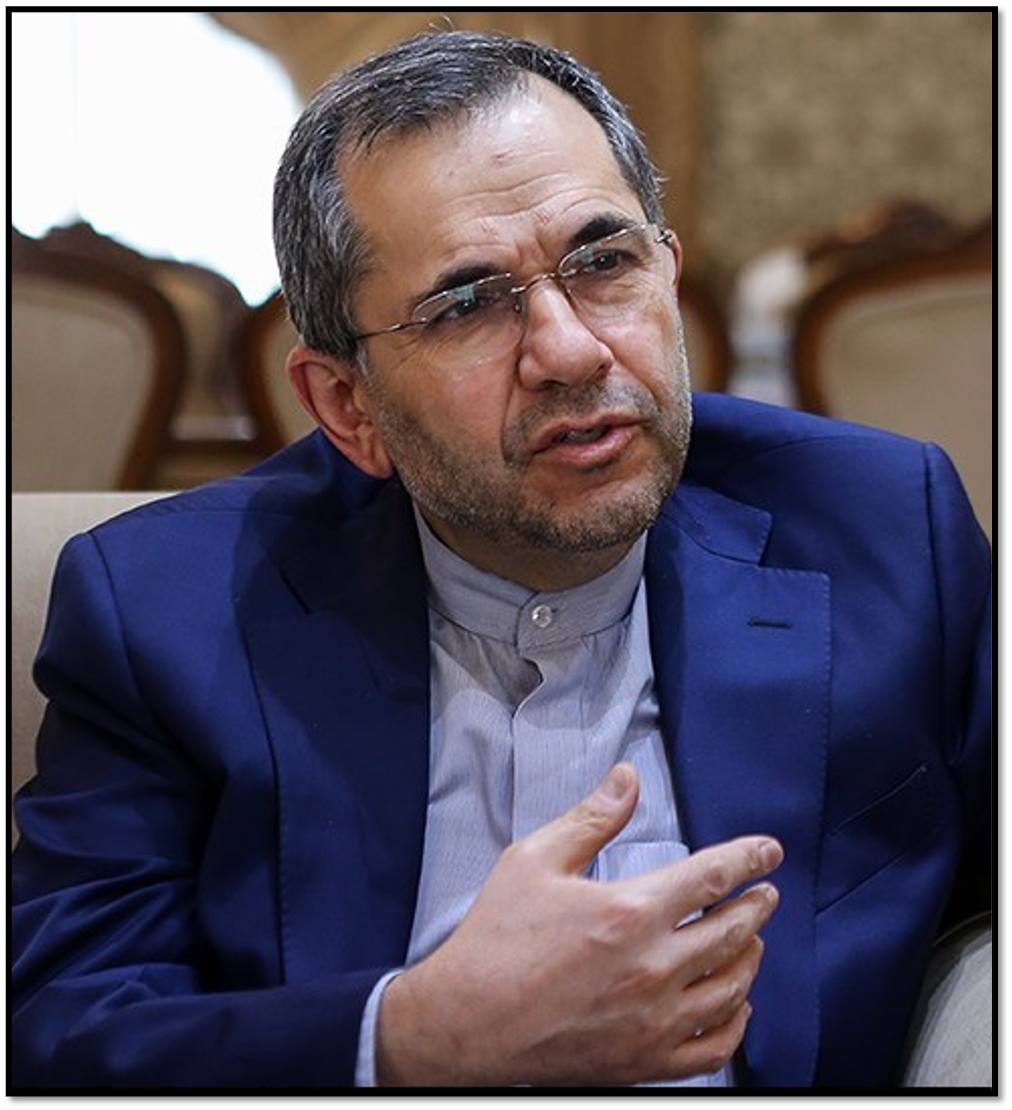
Wars and destructions inflicted on civilian lives and infrastructures are not acceptable, wherever they occur. The Islamic Republic of Iran calls for urgent cessation of hostilities and de-escalation of tensions in the current conflict. In this regard, Iran underlines the essentiality of dialogue to address issues of concerns to all sides leading to long-lasting results.
The UN must always avoid double standards, particularly when it is considering issues related to the maintenance of international peace and security. It is unfortunate to note that the UN, in particular the Security Council, has at times neglected this principle which has undermined its credibility. A case in point is the Security Council’s handling of the conflict in Yemen.
Mr. President,
We believe that the current text of the resolution before the General Assembly lacks impartiality and realistic mechanisms for resolving the crisis through peaceful means. Furthermore, not all member states of the United Nations were given the opportunity to engage in negotiations on the text of the resolution.
It should be emphasized that the General Assembly is not in a position to determine the existence of an act of aggression because, in addition to Article 39 of the Charter, GA Resolution 3314 of 14 December 1974 calls on the Security Council to determine the existence of an act of aggression.
Moreover, convening the emergency special session based on the General Assembly resolution 377 A (V) shall not be considered as the end of the dialogue.
My government continues to call for a comprehensive, peaceful, and sustained resolution to the current conflict including an immediate cease-fire and start of the dialogue as well as provision of humanitarian assistance to the people in need.
For the above-mentioned reasons, my delegation abstained from voting on this draft resolution (A/ES-11/L.1).
Iran-Russia Ties
Iran’s position on Ukraine reflected its close ties with Russia. Iran, the 28th largest economy in the world, is under biting U.S. sanctions. It has sought to expand trade with the Russia, 12th largest economy in the world. After Raisi won the presidential election on June 19, Putin was the first foreign leader to congratulate him. Putin expressed hope that the two countries could expand cooperation during Raisi’s presidency.
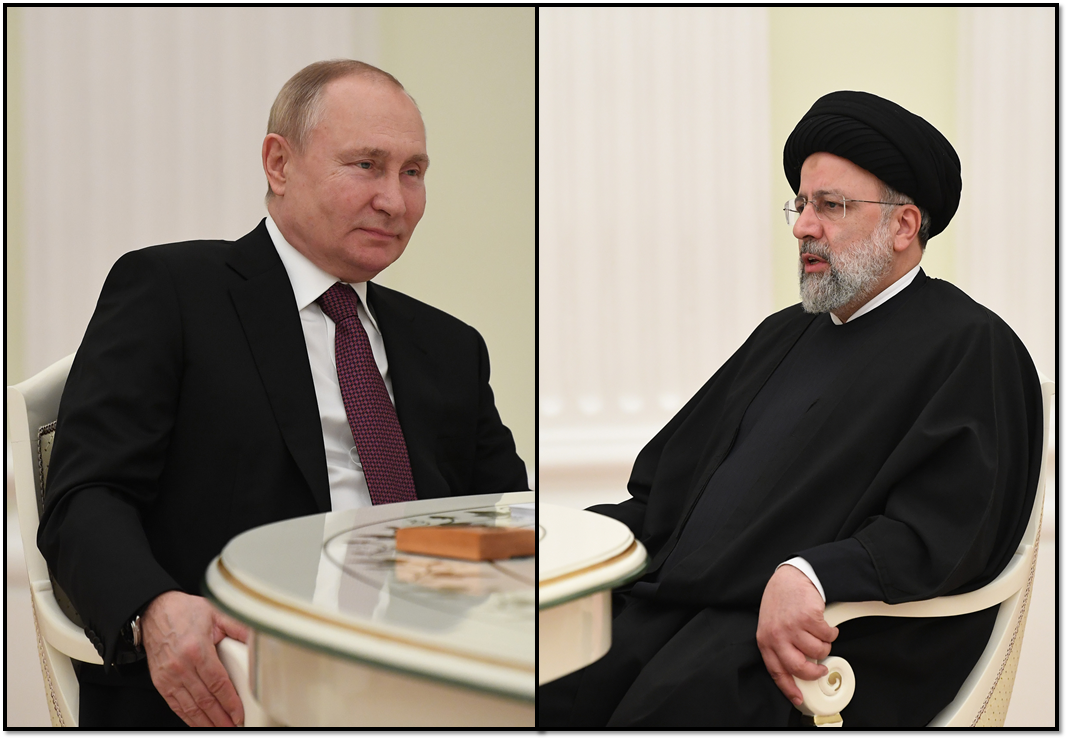
In January 2022, Raisi visited Moscow. In wide-ranging talks, Iranian and Russian officials discussed cooperation on trade, banking, transportation, energy, regional security, and more. The two-day trip was the first visit to Russia by an Iranian president since Hassan Rouhani’s visit in 2017. It was Raisi’s first state visit since taking office in August 2021. His only other trips abroad were to multilateral summits in neighboring Tajikistan and Turkmenistan.
“We in Iran have no limits for expanding ties with Russia,” Raisi told Putin during a three-hour meeting at the Kremlin. Raisi presented a draft of a new 20-year strategic cooperation agreement, which would supersede the original treaty from 2001, which was renewed three times, as recently as March 2021.
Iran and Russia have expanded political, economic and military cooperation since the Soviet Union dissolved in 1991. They both oppose the U.S.-led world order, support the Assad regime in Syria, and see Sunni jihadist movements, such as ISIS, as serious threats.
Yet some statements on Ukraine have reflected an inherent tension in Iran’s position. “Based on its main foreign policy principles, the Islamic Republic of Iran is against domination and being dominated, and supports all nations' right to decide for their own future,” Raisi told his cabinet on February 27. “While understanding the security concerns regarding the decades of NATO expansionism, the Islamic Republic of Iran emphasizes the preservation of the territorial integrity and national sovereignty of all countries.”
Since the 1979 revolution, Iran has, at least rhetorically, condemned foreign intervention in other countries’ affairs. “The foreign policy of the Islamic Republic of Iran is based upon the rejection of all forms of domination, both the exertion of it and submission to it,” according to Article 152 of the constitution.
Iran’s commitment to territorial integrity is rooted in its own history. Iranian leaders have often criticized previous rulers for failing to defend the country’s borders. “The evil Achaemenid dynasty, which committed the greatest massacres and betrayals in the country, handed over the country to Greece (Alexander the Great) after the decline in power,” General Mohammad Reza Naghdi, a Revolutionary Guards commander, said in 2021. “On the other hand, study the histories, you will see that the Sassanids and other governments each somehow handed over the country to others – the Mongols or others.”
Iran’s modern history has also included humiliating losses – often involving Russia. In the 19th century, under the Qajar dynasty, Iran ceded territory several times to Russia, Britain and other powers.
Russia intervened on the side of the monarchy during Iran’s 1905-1911 Constitutional Revolution. After World War I, the Soviet Union backed the secession of territory in northwestern Iran. The Soviet Union, along with Britain, occupied Iran during World War II. After World War II, the Soviet Union supported the secession of Iranian Azerbaijan and Kurdistan. Joseph Stalin initially refused to withdraw its troops.
Saddam Hussein’s invasion of Iran in 1980 and the ensuing eight-year war – the bloodiest in the Middle East – did not result in a loss of territory but was nonetheless especially traumatic. The Soviet Union’s support for Iraq during the war, which resulted in the death of 300,000 or more Iranians, has been another sore subject for Iran-Russian relations.
Iranians have subsequently been suspicious of Russia, which has been a factor in the rocky relationship between the two countries. In 2016, Iran allowed Russian bombers to fly missions over Syria from Iran’s airbase in Hamadan. Iranian Defense Minister Hossein Dehghan dismissed domestic criticism, including from lawmakers, over the foreign military presence in Iran. He reproached Moscow for the way in which it publicized the deployment.
“Russians are interested to show they are a superpower to guarantee their share in the political future of Syria and, of course, there has been a kind of show-off and ungentlemanly [attitude] in this field," Dehghan said. He emphasized that there was no written agreement between the two countries and that the operational cooperation was temporary and limited to refueling. Nevertheless, Iran abruptly stopped the flights after just one week.
“Unlike so many Third World countries during the Cold War, where an anti-Western outlook resulted in a willingness to cooperate with Moscow,” Mark Katz, a professor at George Mason University, wrote at the time, “an anti-Russian outlook has long prevailed even among the most anti-American elements inside Iran.”
The historical memory of military losses to Russia are fresh in the minds of the general public. In 2021, dissident rapper Toomaj Salehi released a song and music video criticizing Iran’s government for expanding ties with Russia and China. It was titled “Torkamanchay” after the 1828 treaty with Russia that ceded land in the South Caucasus to Russia after the Russo-Persian War.
Haven’t you sucked enough essence out of us? Haven’t you made us isolated enough in the world?
Haven’t you suffocated us enough? Haven’t you played us enough times?
Haven’t you f***** us up enough? Haven’t you robbed us enough?
Now, you want to give half of it (Iran) to China and the rest to Russia?
Garrett Nada is the managing editor of The Iran Primer. Follow him on Twitter @GarrettNada.
Photo Credits: Ravanchi by Masoud Shahrestani via Tasnim News Agency (CC BY 4.0); Iran territorial map via Defense Intelligence Agency
